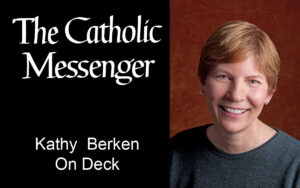By Kathy Berken
When I worked at The L’Arche community in Clinton, I quickly became aware of the use of “good job!” as a positive reinforcement. Everyone used it for almost every acceptable thing anyone did. The words brought lots of smiles and joy.
 So, first, a disclaimer. While I have come to believe that praise is highly overrated, and can even be counterproductive, I still believe that offering praise to people with cognitive disabilities is great for many good reasons. But that’s not why I’m writing this.
So, first, a disclaimer. While I have come to believe that praise is highly overrated, and can even be counterproductive, I still believe that offering praise to people with cognitive disabilities is great for many good reasons. But that’s not why I’m writing this.
A friend who works with children posted on her Facebook page that her supervisor sent her an article saying that they need to stop telling children “good job.” I immediately agreed with her and her friends’ outrage: “No way am I not going to tell my child that she did a good job picking up her toys!” “When my son does something right, I’m going to tell him what a good job he did!” “This is BS!” The outrage lasted for days.
But I was curious as to why someone would make such an unusual request, so I went online to learn. Surprisingly, I found several in-depth, well-researched articles about this on reputable sites. For example, Jim Taylor, Ph.D., said in Psychology Today (9/3/’09) that comments such as “good job,” are empty and insidiously detrimental. Why?!
We have the right intention; we want to give children positive feelings by letting them know they are doing something right and good. But here’s the problem. Unintentionally, we are creating in them a subtle, but powerful, dependence on the approval of others for their actions using words that reflect our feelings rather than how the child independently feels. A child puts away her toys and we are happy that she complied and is learning how to be responsible and organized; both are good virtues. So, we instinctively say, “good job” (“I approve”), thinking that praising her will help her repeat the desired behaviors. But they could have the opposite effect since the child’s sense of accomplishment is not self-driven, but by our approval. That’s a game-changer.
As many others, I did this for years with my grandchildren and thought nothing of it. But when I read and pondered Taylor’s arguments, a light went on. I thought of the times when I had done something I liked, and how I felt about others’ responses. After giving a retreat conference that I thought had good content, someone’s “good job” felt empty compared with the person who said, “I got a lot out of your talk today because I could relate to your stories and I will take with me the ideas (which she detailed) you offered.”
I do respond to “good job” with “thank you,” because I appreciate the intention but, if possible, I ask what they found helpful. I do not depend on others for their praise but instead welcome both constructive criticism and reasons why they liked what I said or did, so I can improve.
You might think that this is just semantics. But it’s not. Words matter because words have meaning. Hear what Alfie Kohn, teacher, author and writer for Atlantic Monthly, Parents, and Psychology Today, has to say: A stream of empty words of praise has the potential to manipulate people (children especially) into doing things only your way, to create “praise junkies,” to lessen their own pleasure at doing something, to cause them to lose interest in the activity, or to reduce their achievement (alfiekohn.org/article/five-reasons-stop-saying-good-job).
So, what are the alternatives? Experts suggest that to instill self-confidence in a child rather than dependence on our approval, reinforce positive behavior with gratitude and/or specifics about what you noticed, ask questions or just smile, letting them know you noticed, allowing them to make their own judgment about what they have done.
Regarding God, on the other hand, use any words you like, offer as much praise as you want, and once Easter arrives, sing every Alleluia you can muster!
(Kathy Berken has a master’s degree in theology from St. Catherine University, St. Paul, Minn. She lived and worked at The Arche, L’Arche in Clinton 1999-2009 and is author of “Walking on a Rolling Deck: Life on the Ark (stories from The Arch).”)











